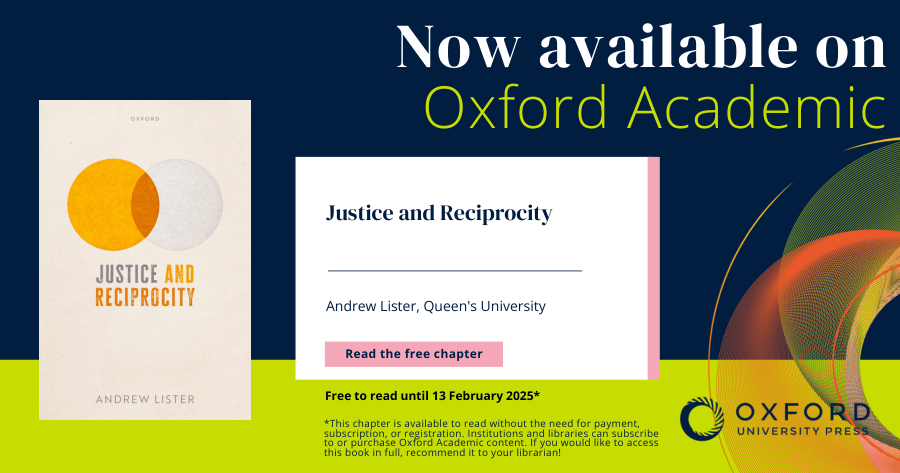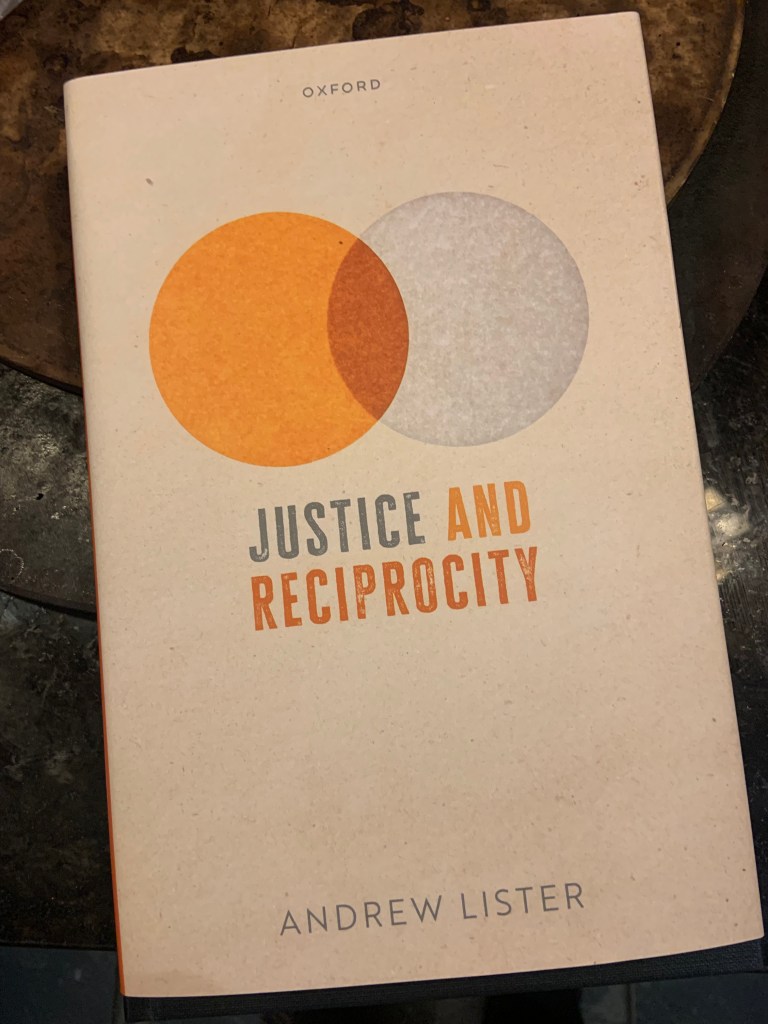In this post, I want to explain why thinking of justice in terms of reciprocity – both justice realizing reciprocity and justice being limited by reciprocity – is different than what has become known as “luck egalitarianism.” I’m building on some comments in the first chapter of my recent book Justice and Reciprocity (26-27).
In an often-cited passage from 1989’s “On the Currency of Egalitarian Justice,” G. A. Cohen explained (with the help of Queen’s own Will Kymlicka) how Ronald Dworkin defanged the central conservative / classically-liberal / libertarian critique of the welfare-state:
“In a brilliant exposition of how Dworkin’s theory corrects deficiencies in Rawls’s, Will Kymlicka remarks that “it is unjust if people are disadvantaged by inequalities of their circumstances, but it is equally unjust for me to demand that someone else pay for the costs of my choices.” (…) Dworkin has, in effect, performed for egalitarianism the considerable service of incorporating within it the most powerful idea in the arsenal of the anti-egalitarian right: the idea of choice and responsibility” (933).
In a 1995 essay called “Equality and Responsibility,” economist John Roemer spelled out this strategy strategy of turning the choice-and-responsibility critique against itself. The key was to justify equalizing policies on the basis of the widely accepted principle of equal opportunity. Egalitarians should frankly accept that it is legitimate for people’s incomes and other advantages to vary based on their preferences and choices, Roemer argued, but insist that it is unfair for incomes to vary based on factors over which one has no control, factors such as the social class of one’s parents and one’s genetic endowment. Roemer’s principle of equal opportunity followed Kymlicka’s circumstance-choice principle closely:
“I say that equality of opportunity has been achieved among a group of people if society indemnifies persons in the group against bad consequences due to circumstances and brute luck, but does not indemnify them against the consequences of their autonomous choices. Thus an equal-opportunity policy must equalize outcomes in so far as they are the consequences of causes beyond a person’s control, but allow differential outcomes in so far as they result from autonomous choice”
In other words:
- Justice requires collective compensation for bad “brute” luck (events over which the person has control).
- Justice does not require, and in fact argues against, collective compensation for bad “option” luck (bad luck consequent to a decision to take a risk, or conduct that the person should have recognized as risky).
This two-pronged principle has come to be known by the label “luck egalitarianism.”
Roemer went on to apply this idea to the issue of funding for health care. To what extent society should pay for health care, as opposed to the individual? The problem is that the distinction between brute and option luck is not all or nothing, but a matter of extent. Take cancer caused by smoking. According to an equality-of-opportunity ethic, society is required by justice to pay for treatment of smoking-related cancer to the extent that a person’s decision to smoke is determined by their circumstances, as opposed to being a matter of autonomous choice. So, if we find that men are more likely to have smoked than women, for example, we will relativize our assessment of individuals’ responsibility to the medians of their respective groups (since no one chooses to belong to such groups). And we will conclude that at least as far as fairness or justice is concerned (setting aside aggregate efficiency, the possibility of Pareto improvements, humanity, or any other relevant values – Roemer wasn’t arguing for levelling down), men should pay less for cancer treatment caused by smoking than women. For other types of cancer, the ones people can’t do anything about, society should pay the whole cost of medical care. Roemer’s view was more complicated than that (it involved multiple demographic variables), but that’s the basic idea, to measure a person’s degree of responsibility relative to the median of the particular social type to which they (unchosenly) belong.
The suggestion that it is unjust for the state to help people who’ve made bad choices came under fire in Elizabeth Anderson’s widely discussed “What is the Point of Equality?” (1999). A negligent uninsured driver is injured as a result of making an illegal turn that caused an accident. Does luck egalitarianism require that paramedics let him die? Presumably we must care for him until we can sort out who is at fault, but after that, luck egalitarianism seems to call for the “abandonment of negligent victims” and “discrimination among the disabled” (296).
But was the original diagnosis of the anti-egalitarian critique correct? The problem is that “choice and responsibility” is a broad heading that includes different things. One thing it includes is imprudent choices, choices that leave the chooser hurt, sick, or without any income, for example. Many such choices people would have made whether or not they can count on help from others. People simply make mistakes. Everyone makes mistakes at some point in their life!
Another thing choice-and-responsibility includes is exploitative choices. Here I’m referring to people who take advantage of other people performing their duties of care and mutual assistance in order to reduce their own efforts to care for and provide for themselves, and so make themselves less likely to be able to help others who really do need help. The negligent hospital patient is imposing costs on others, to be sure, but negligence is not exploitation. The negligent person is risking their own life, and paying real costs even if we do help them, and would have behaved this way anyway. In contrast, someone who responds to the availability of assistance by reducing their own efforts seems to take advantage of others’ good will. In short, what I am suggesting is that the anti-egalitarian critique of the welfare state may have been motivated by concerns about reciprocity, rather than about responsibility in general.
The idea that attacks on the welfare state appeal to reciprocity is not new; see in particular Stuart White “Liberal Equality, Exploitation, and the case for an Unconditional Basic Income” (1997), “Social Rights and the Social Contract” (2000), and The Civic Minimum (2003). What is interesting, though, is to contrast the critique based on reciprocity with the critique based on choice-sensitivity. Limiting justice by reciprocity does not rule out having duties to help those who have made imprudent choices. The negligent driver might be fully willing to help others when they are in need, even as a result of bad choices. Conversely, someone who suffers from bad brute luck might not be willing to help out others, even those suffering from bad brute luck. Must we help them? The upshot is that thinking of justice as reciprocity aligns with neither half of the luck egalitarian principle stated above.
To be sure, if someone is facing death we shouldn’t ask too many questions. Maybe we should simply save their life even if we know for sure the other person wouldn’t do likewise, if we can do so without too much risk to ourselves. But luck egalitarianism is a conception of equality, not just sufficiency (not just a ‘get everyone above a minimum threshold’ view). Where demands for equality are in play, I think reciprocity conditions make more sense.
Public policy will of course have to be governed by general rules based on limited information about individual character. But part of the reason for having general policies spelled out in formal rules centrally monitored and enforced is the concern about assurance of compliance that arises for people motivated by reciprocity – people wanting to do the right thing and willing to do the right thing even without threat of sanction, but only if they expect others generally to comply (which may require threat of sanction).
Here is a complication, though. As Joe Heath has argued, there is a universal-gains argument for risk-pooling (pp.322-24, 339-341), and so a market failure / efficiency case for public insurance, particularly with respect to health insurance. Provision of insurance against a risk creates a moral hazard that people will reduce the care they take to avoid the risk. But is this a moral problem, or just an efficiency problem, just a cost that insurance programs need to take into account?

